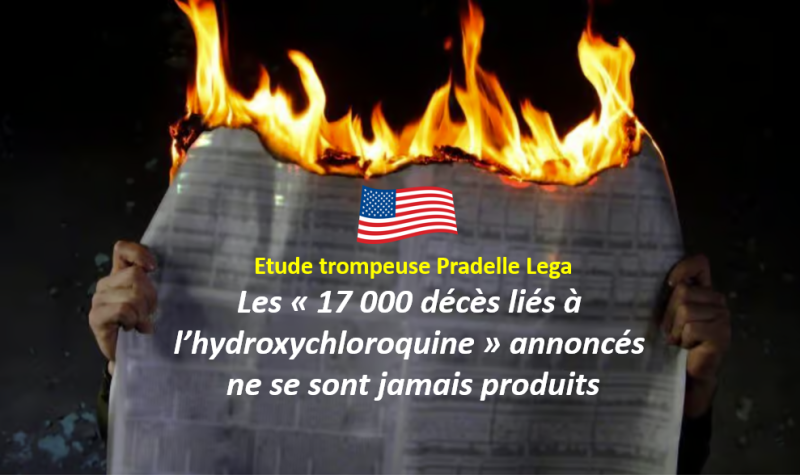
Brownstone, France-Soir Seen from the United States: The “17,000 deaths linked to hydroxychloroquine” announced never happened
Editor's note: In the United States, the The misinformation caused by the now-retracted Pradelle Lega study was substantial. This study led to an erroneous assessment of the effect of hospital treatment – misleadingly creating 17,000 deaths from taking hydroxychloroquine as covid treatment. On Bing.com, 691,000 results result from the keyword search “hydroxychloroquine death”.
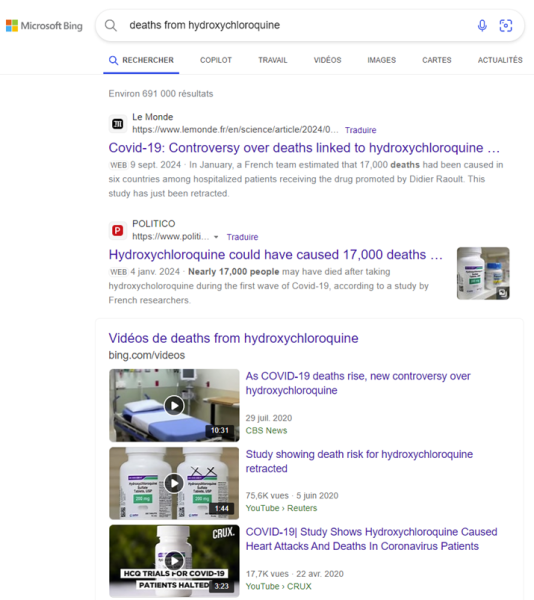
Dr. David Gortler (1) has prepared an article on the misleading and retracted study by the review. It was published in English on the Brownstone Institute website. With the author's permission, it is translated into French and republished by France-Soir.
LegaGate seen from the United States as this tweet presents it.
In early January 2024, Americans learned of the publication of an article in the Journal of Biomedicine and Pharmacotherapy from Elsevier, supervised by Dr. Danyelle Townsend , professor in the Department of Drug Discovery and Biomedical Sciences, School of Pharmacy, University of South Carolina. As Editor-in-Chief, Dr. Townsend reviewed, approved, and published the article titled: “Deaths induced by compassionate use of hydroxychloroquine during the first wave of COVID-19: an estimate.”
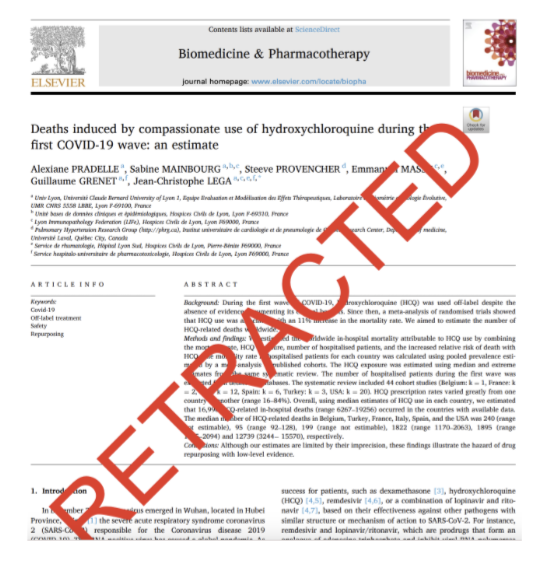
The article was a hypothetical estimate of the number of people who could have died from taking hydroxychloroquine, but this estimate was withdrawn …. The reason for the retraction is that the Belgian dataset that formed one of the bases of the article was found to be “unreliable” (but was actually fraudulent). The article also repeatedly referred to the 2020 RECOVERY clinical trial from the New England Journal of Medicine. The RECOVERY trial is well known to be a deeply flawed study that, in addition to implementing delayed treatment in critically ill covid patients, used extremely high doses of HCQ.
The authors of the now-retracted publication were all French or Canadian, with the lead author being a pharmacist named Alexiane Pradelle. According to a rudimentary internet search, Dr. Pradelle had never published before. Subsequently, the authors listed were qualified physicians, pharmacists, and/or professors in their respective disciplines. Lead and corresponding author Jean-Christophe Lega leads the Evaluation and Modeling of Therapeutic Effects team at the University of Lyon.
Hydroxychloroquine’s legendary safety record contrasts with the data
In addition to being a hypothetical estimate, the paper also attacks the legendary safety of HCQ, contradicting centuries of safety for quinolines as a class.
HCQ, chloroquine, and quinine are structurally and pharmaceutically/mechanically related, sharing the same quinoline structural group. The original iteration of quinine was a very fortunate discovery dating back to the 1600s (at least) as a medicinal drink used by Jesuit missionaries in South America. It is found naturally in the bark of the Cinchona tree (also known as the “Quina-Quina” tree).
Quinine is still available today both as a prescription medication, for similar indications to HCQ, including malaria…and as a treatment for Covid-19.
Quinine is so safe that it is perhaps unique in that the FDA is simultaneously authorizing its use over the counter, as an ingredient in waters tonics.
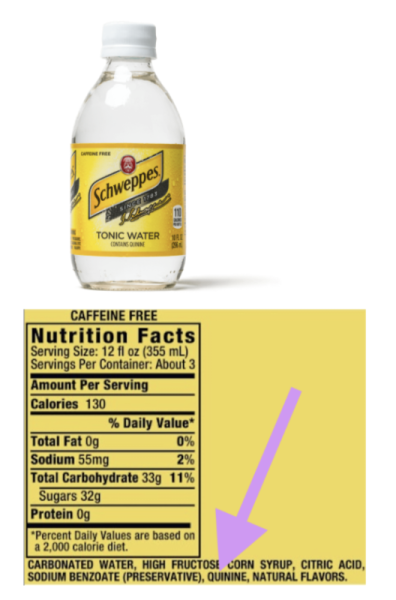
Schweppes Tonic “contains quinine,” as do all tonic waters.
Winston Churchill once said:
HCQ is also safe when used appropriately and under medical supervision.
The CDC describes HCQ as ” a relatively well-tolerated drug ” and states that ” HCQ can be prescribed to adults and children of all ages. It can also be taken safely by pregnant women and nursing mothers ,” referring to its long-term use in chronic conditions.
The basic logic is that if a drug is safe for long-term use, it is also safe for short-term use, including (and especially) early treatment/pre-exposure prophylaxis of Covid-19. These are fundamental principles of pharmacology that every pharmacist or physician should know. – and even more a professor serving as editor-in-chief of a journal at a state pharmacy school funded by taxpayers.
Did not a single person on its editorial board of over 50 “peer reviewers” and staff consider the famous and storied history of HCQ (and its predecessors) and the inconsistency of the results of this study before choosing to publish data that denigrates the safety of HCQ ?
The correct answer to this question may well be: “no”…
The journal's editorial board members all appear to be laboratory (non-clinical) researchers, based on their biographies. While the committee presents itself as meeting DEI's requirements for “gender diversity,” a more important question may be whether they have the appropriate qualifications and experience to review and advise on clinically complex drug safety and epidemiology topics in the first place.
Is it now permissible for anyone to give their opinion on drug safety issues in specialized clinical pharmacology ?
In some newspapers/news publications, the answer to this question seems to be: “yes”…
These “17,000 deaths” never happened
Another point of confusion has surrounded the interpretation and promotion of this little-known publication by the lay press.
To be exact: there is no a never had “17,000 deaths”; this was always a hypothetical extrapolation of people who could have died, based on “unreliable” (i.e., actually fraudulent) databases in addition to the problematic dosing and timing of the late-stage RECOVERY trial mentioned earlier.
Yet Josh Cohen, a senior health care columnist for Forbes.com, used the publication to headline an absurdly biased op-ed against HCQ, claiming that Trump’s HCQ proposal was “linked to 17,000 deaths.” Forbes’ Tufts, Harvard, and University of Pennsylvania-trained “health analysts” misrepresented or didn’t seem to understand the methodology or projections of the now-retracted study. From there, it went downhill. Just hours after publication, very similar, now objectively inaccurate, highly politicized, and apparently coordinated attacks on HCQ and Trump were published by: The Hill, Politico, Frontline News, Scripps News, the Guardian, KFF Health News, News Nation, Newsweek, AOL.com, Yahoo News and Daily Kos, plus a multitude of leading regional, international and U.S. federal media organizations, many believing that wrong that 17,000 deaths had already occurred and that the blood of the (imaginary) victims was already on Donald Trump's hands.
As of September 15, 2024 , the above and other articles still appear very prominently (on the first page) of a Google search for “hydroxychloroquine deaths”… which never happened .
Here are some screenshots of headlines referring to non-existent deaths based on a now-retracted study:
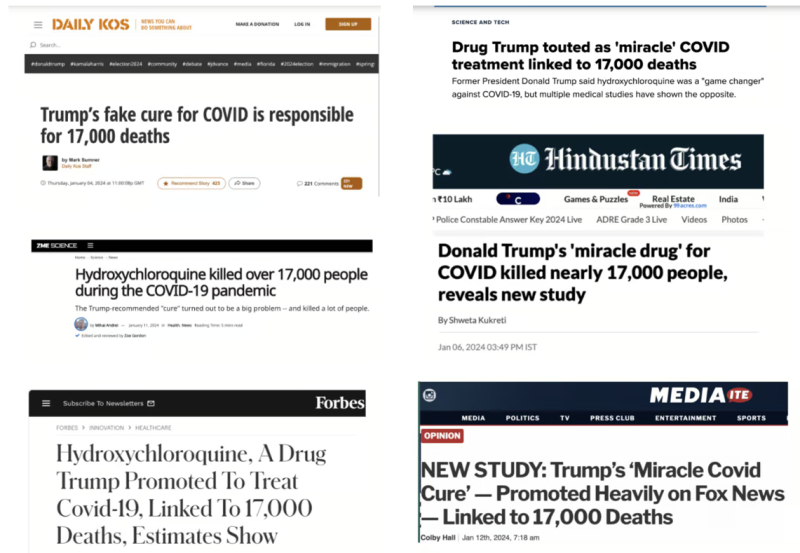
Or
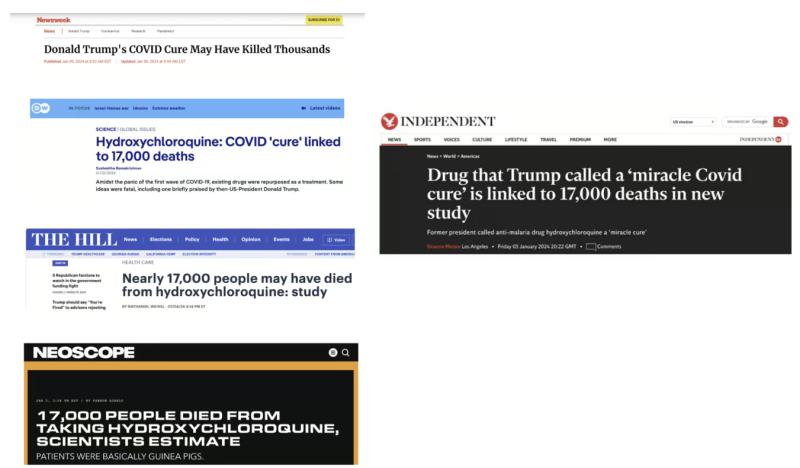
The editors of the journal were immediately notified of the results doubtful
Almost immediately after publication on January 2, 2024, its critical flaws, including basic calculation errors among many other shortcomings, were brought to Dr. Townsend's attention by Xavier Azalbert and attorneys for the nonprofit BonSens.org beginning on January 7, 2024. In fact, a total of 9 communications were sent, but none of them were ever shared as “letters to the editor” by Dr. Townsend as a good faith effort to inform readers of specific potential shortcomings, as is customary. fluently.
Dr. Townsend seems to have forgotten that flawed medical data and publications can harm patients and has kept legitimate and important criticisms of studies to herself. Instead of taking responsibility and making a high-level decision, she passed the buck to a publication ethics committee, delaying the necessary retraction.
It took 234 days (or about 7 months, from January 2 to August 26, the date of publication) for Dr. Townsend's Journal of Biomedicine and Pharmacotherapy to finally retract this “unreliable” article. But by this point, millions of people around the world had already been (and continue to be) polluted with outrageously false information about non-existent HCQ-related deaths.
This raises some questions about Dr. Townsend’s duties and responsibilities as editor:
- What efforts were made to correct erroneous headlines and articles published by the popular press, wrongly frightening patients, pharmacists, and physicians, by fueling false ideas about HCQ ?
- What efforts were made to inform media outlets that the data in the peer-reviewed publication were in question ? (She refers to “a number of letters to the editor and correspondence from readers »).
- What immediate efforts are being made to inform news organizations and/or amplify search engine results regarding the now-retracted publication ?
- What funding source or individual paid the $3,490 publication fee (excluding taxes and fees) ? (Note: Reputable academic journals do not charge for publishing articles.)
- Does Elsevier’s Journal of Biomedicine and Pharmacotherapymeet any definitions of what is considered a predatory publisher ?
- Was this editorial board qualified to review regulatory, drug safety, epidemiology, or any other clinical topic? ?
- Are the ramifications of the publication of this review and its subsequent retraction known to the University of South Carolina administration, its co-faculty, and the body that adjudicates its code of ethics and standards of practice??
- This is not the first time Townsend has had to retract articles, which is usually very rare for reputable journals. Will Elsevier, which publishes over 2,700 journals, allow this editorial board to opine or publish further articles on clinical topics? ? Can the editor and/or editorial board be trusted to recuse themselves from opinions on topics outside their area of expertise? ?
- What should be done to prevent a similar incident from happening again at the University of South Carolina and other taxpayer-funded institutions? ?
Beyond that, what ramifications/penalties (if any) would follow? will produce for other prominent authors/editorsof the Lancet and from the New England Journal of Medicine on Covid-19 whose articles have also been retracted after being deemed to be based on so-called “unreliable” databases (e.g., nonexistent ) ?
Ethical scientists who believe in truth, transparency, and academic accountability are waiting for justice to be done in the medical and academic fields.
Unethical scientists are also watching this unfold, twiddling their moustaches, inquiring about what they could potentially do one day with impunity.
DISCLAIMER: This article is not medical advice. DO NOT start or stop taking any medication without first discussing it with a pharmacist or doctor you know and trust.
(1) About the Author: David Gortler, Pharm. D Dr. David Gortler is a pharmacologist, pharmacist, research scientist, and former member of the FDA leadership team who served as a senior advisor to the FDA Commissioner on FDA regulatory affairs, drug safety, and FDA science policy. He is a former didactic professor of pharmacology and biotechnology at Yale University and Georgetown University, with over a decade of academic teaching and laboratory research, as part of nearly two decades of experience in drug development. He is also a research fellow at the Center for Ethics and Public Policy and a 2023 Brownstone Fellow.
ALSO READ
#LyonBordeauxGate: Study confirms that the alleged 17,000 deaths attributed to hydroxychloroquine are based on a fraudulent study. Pradelle, Lega et al. authors of false science ? HEALTH – Science is a combat sport, but could it also be an endurance sport. For example, the publication of letters of concern questioning the s… July 31, 2024 – 5:00 PM Society Pradelle Lega's scientific fraud is a real danger for science – Debriefing with Vincent Pavan The scientific study that claimed through modeling that hydroxychloroquine would have killed 17,000 people was retracted after eight months of media hype and… September 03, 2024 – 12:12 PM Videos #LyonBordeauxGate: Are Professors Lega and Molimard laundering false information ? HEALTH – On January 4, 2024, a highly questionable and contested study was published by the peer-reviewed journal Biomedecine et Pharmacotherapy. Immediately, the … January 26, 2024 – 18:17 Society Dual therapy (Hydroxychloroquine and Azithromycin) at the dosages prescribed at the IHUM does indeed reduce the viral load. Serious error by the health authorities ? The role of hydroxychloroquine (HCQ) in reducing the viral load of patients with COVID-19 has been the subject of much controversy. It is in this… August 30, 2024 – 5:00 p.m. Society
You liked the article ? It mobilized our editorial staff, which lives only on your donations.
Information has a cost, especially since competition from subsidized editorial staff requires increased rigor and professionalism.
With your support, France-Soir will continue to offer its articles for free because we believe that everyone should have access to free and independent information to form their own opinion.
You are the sine qua non condition for our existence, support us so that France-Soir remains the French media that makes express the most legitimate.

